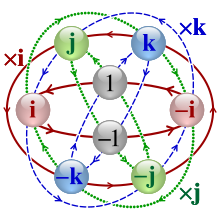SetElementBoneQuaternion: Difference between revisions
Jump to navigation
Jump to search
Tag: Undo |
Fernando187 (talk | contribs) (Remove obsolete Requirements section) |
||
| (3 intermediate revisions by one other user not shown) | |||
| Line 2: | Line 2: | ||
{{Client function}} | {{Client function}} | ||
{{New feature/item|3.0161|1.6.0| | {{New feature/item|3.0161|1.6.0|22741| | ||
This function determines how a particular bone rotates in relation to the element.<br/> | This function determines how a particular bone rotates in relation to the element.<br/> | ||
The use of [https://en.wikipedia.org/wiki/Quaternion quaternions] are more effective and do not generate issues like gimbal lock that might arise with [https://en.wikipedia.org/wiki/Euler_angles Euler angles], so they are a preferable choice for rotation. | The use of [https://en.wikipedia.org/wiki/Quaternion quaternions] are more effective and do not generate issues like gimbal lock that might arise with [https://en.wikipedia.org/wiki/Euler_angles Euler angles], so they are a preferable choice for rotation. | ||
| Line 9: | Line 9: | ||
{{Tip|If you want to attach an element to a bone, see [[attachElementToBone]].}} | {{Tip|If you want to attach an element to a bone, see [[attachElementToBone]].}} | ||
{{Note|If you want to apply the rotation, [[updateElementRpHAnim]] must be called after this function.}} | {{Note|If you want to apply the rotation, [[updateElementRpHAnim]] must be called after this function.}} | ||
==Syntax== | ==Syntax== | ||
<syntaxhighlight lang="lua"> | <syntaxhighlight lang="lua"> | ||
bool setElementBoneQuaternion(element ped, int bone, float x, float y, float z, float w) | bool setElementBoneQuaternion(element ped, int bone, float x, float y, float z, float w) | ||
</syntaxhighlight> | </syntaxhighlight> | ||
[[File:Cayley_Q8_multiplication_graph.png|thumb|[https://en.wikipedia.org/wiki/Cayley_graph Cayley Q8 graph] showing the six cycles of multiplication by <span style="color: red;">'''i'''</span>, <span style="color: green;">'''j'''</span> and <span style="color: blue;">'''k'''</span>.]] | |||
===Required Arguments=== | ===Required Arguments=== | ||
| Line 47: | Line 50: | ||
) | ) | ||
</syntaxhighlight> | </syntaxhighlight> | ||
==See Also== | ==See Also== | ||
{{Client_element_functions}} | {{Client_element_functions}} | ||
Latest revision as of 17:35, 7 November 2024
| Tip: If you want to attach an element to a bone, see attachElementToBone. |
Syntax
bool setElementBoneQuaternion(element ped, int bone, float x, float y, float z, float w)
Required Arguments
- ped: The element (ped or player) on which the bone's rotation will be set.
- bone: The ID of the bone to set the quaternion of.
- The bone ID corresponds to specific body parts like arms, legs, spine, head, etc.
- The full list of bones is available in the Bone IDs reference.
- x: The quaternion's coefficient of the 𝑖 component.
- This represents the rotation around the x-axis and is the first imaginary part of the quaternion.
- y: The quaternion's coefficient of the 𝑗 component.
- This represents the rotation around the y-axis and is the second imaginary part of the quaternion.
- z: The quaternion's coefficient of the 𝑘 component.
- This represents the rotation around the z-axis and is the third imaginary part of the quaternion.
- w: The real part of the quaternion.
- This denotes the scalar component of the quaternion, which is linked to the angle of rotation.
- The w value is derived by taking the cosine of half of the rotation angle, defined as the overall angle of rotation.
Returns
Returns true if the set was successful, otherwise returns an error message and returns false.
Example
This example rotates the player's pelvis 180 degrees around an arbitrary axis.
The use of updateElementRpHAnim is necessary here as it applies the rotation.
local playerBone = 1
local playerBoneX, playerBoneY, playerBoneZ = 0.577, 0.577, 0.577
local playerBoneW = 0
addEventHandler("onClientPedsProcessed", root,
function()
setElementBoneQuaternion(localPlayer, playerBone, playerBoneX, playerBoneY, playerBoneZ, playerBoneW)
updateElementRpHAnim(localPlayer)
end
)
See Also
- getElementBoneMatrix
- getElementBonePosition
- getElementBoneRotation
- getElementBoundingBox
- getElementDistanceFromCentreOfMassToBaseOfModel
- getElementLighting
- getElementRadius
- isElementCollidableWith
- isElementLocal
- isElementOnScreen
- isElementStreamable
- isElementStreamedIn
- isElementSyncer
- isElementWaitingForGroundToLoad
- setElementBoneMatrix
- setElementBonePosition
- setElementBoneRotation
- setElementCollidableWith
- setElementStreamable
- updateElementRpHAnim
- Shared
- attachElements
- createElement
- destroyElement
- detachElements
- getAttachedElements
- getElementAlpha
- getElementAttachedOffsets
- getElementAttachedTo
- getElementByIndex
- getElementByID
- getElementChild
- getElementChildren
- getElementChildrenCount
- getElementCollisionsEnabled
- getElementColShape
- getElementData
- getAllElementData
- hasElementData
- getElementDimension
- getElementHealth
- getElementID
- getElementInterior
- getElementMatrix
- getElementModel
- getElementParent
- getElementPosition
- getElementRotation
- getElementsByType
- getElementsWithinColShape
- getElementsWithinRange
- getElementType
- getElementVelocity
- getLowLODElement
- getRootElement
- isElement
- isElementAttached
- isElementCallPropagationEnabled
- isElementDoubleSided
- isElementFrozen
- isElementInWater
- isElementLowLOD
- isElementWithinColShape
- isElementWithinMarker
- setElementAlpha
- setElementAngularVelocity
- getElementAngularVelocity
- setElementAttachedOffsets
- setElementCallPropagationEnabled
- setElementCollisionsEnabled
- setElementData
- setElementDimension
- setElementDoubleSided
- setElementFrozen
- setElementHealth
- setElementID
- setElementInterior
- setElementModel
- setElementParent
- setElementPosition
- setElementRotation
- setElementVelocity
- setLowLODElement
